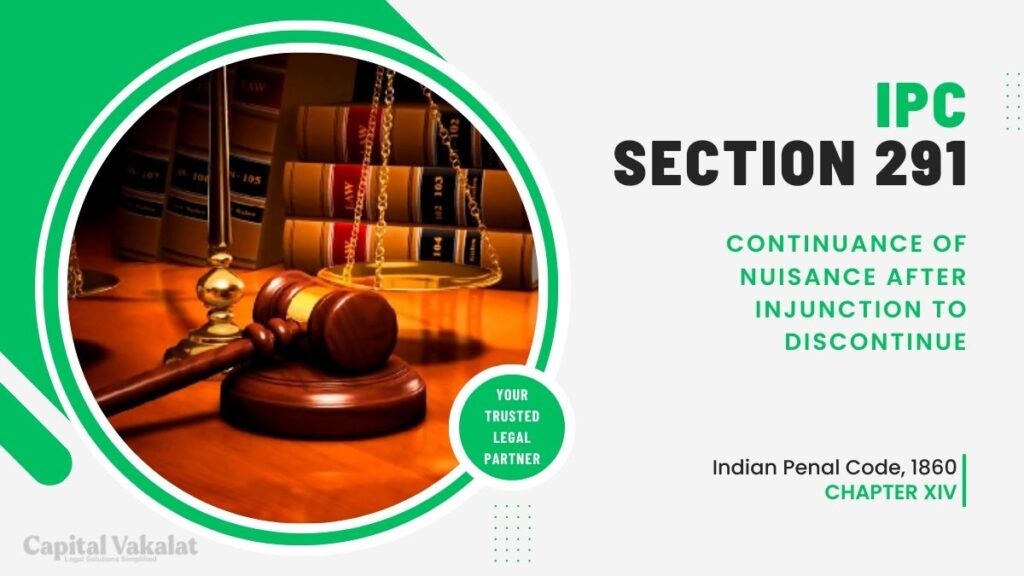The Indian Penal Code (IPC) is a comprehensive legal document that outlines various offenses and their corresponding punishments. Among its provisions, Section 291 addresses the continuance of nuisance after an injunction to discontinue.

In this article, we will delve into the nuances of Section 291 IPC, exploring its significance and implications.
Understanding Section 291 IPC
The Indian Penal Code, enacted in 1860, serves as the primary criminal code in India. Section 291 specifically deals with situations where a nuisance persists despite a court-issued injunction to discontinue the same. It is crucial to comprehend the intricacies of this section to grasp its implications fully.
Continuance of Nuisance Defined
Nuisance, in legal terms, refers to any activity or condition that interferes with the use and enjoyment of property. Section 291 IPC addresses the continuation of such nuisances even after a court has issued an injunction, emphasizing the seriousness of disregarding legal orders.
Injunction to Discontinue
Before delving into Section 291, it’s essential to understand the concept of an injunction. An injunction is a legal remedy that restrains an individual or entity from continuing a specific action. In the context of Section 291 IPC, it serves as a tool to curtail nuisances, and any breach of this court order is dealt with seriously.
Challenges in Implementing Section 291
Despite its clear intent, the implementation of Section 291 comes with its share of challenges. Legal loopholes and misinterpretations can lead to instances where the section may not be as effective as intended. It is crucial to address and rectify such issues to ensure the proper functioning of the legal framework.
Landmark Cases
Several landmark cases have shaped the interpretation and application of Section 291 IPC. Analyzing these cases provides insight into the evolving nature of the law and its impact on the legal landscape. Notable cases serve as precedents, guiding future legal decisions and establishing jurisprudential principles.
Role of Authorities
The effective implementation of Section 291 requires the active involvement of law enforcement and other relevant authorities. Collaborative efforts are essential to identify and address instances of nuisance continuance promptly. A coordinated approach ensures the maintenance of public order and upholds the integrity of legal processes.
Preventive Measures
To mitigate the occurrences covered under Section 291 IPC, individuals and organizations should adopt preventive measures. Proactive steps, such as addressing potential nuisances before they escalate, contribute to a harmonious coexistence within communities. Understanding the legal implications of one’s actions is paramount to avoiding legal complications.
Public Awareness
Promoting public awareness of Section 291 IPC is integral to its effective implementation. Educating the public about the consequences of nuisance continuation and the importance of complying with legal injunctions fosters a sense of responsibility and civic duty. Legal literacy empowers citizens to contribute to the maintenance of a lawful and orderly society.
Conclusion
In conclusion, Section 291 IPC plays a pivotal role in regulating and curbing nuisances that persist despite legal injunctions. Its effective implementation requires a comprehensive understanding of the section, addressing challenges, and fostering collaboration among authorities and the public. By taking preventive measures and promoting awareness, society can contribute to the successful execution of Section 291 IPC, ensuring the maintenance of public order.
Frequently Asked Questions
How does an injunction work in the legal context of Section 291?
An injunction is a court order that restrains an individual or entity from continuing a specific action, and in the context of Section 291 IPC, it is a tool to curtail nuisances.
What challenges are associated with implementing Section 291 IPC?
Challenges include legal loopholes, misinterpretations, and instances where the section may not be as effective as intended.
Why is public awareness crucial for the effective implementation of Section 291 IPC?
Public awareness is essential to ensure that individuals understand the consequences of nuisance continuation and the importance of complying with legal injunctions.
How can individuals and organizations prevent issues covered under Section 291 IPC?
Adopting proactive measures, addressing potential nuisances before escalation, and understanding the legal implications of actions are key preventive measures.